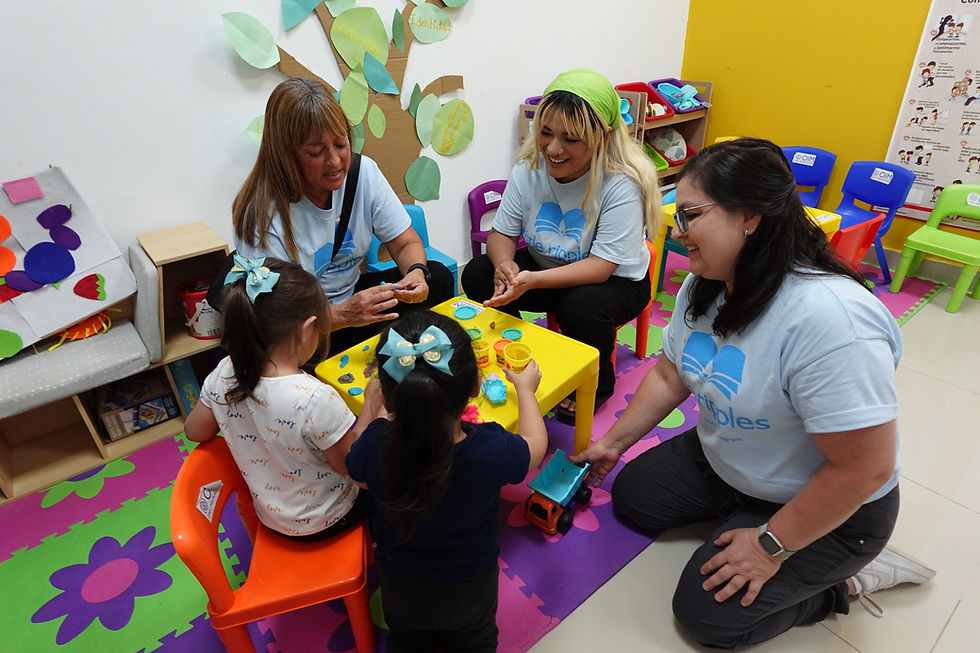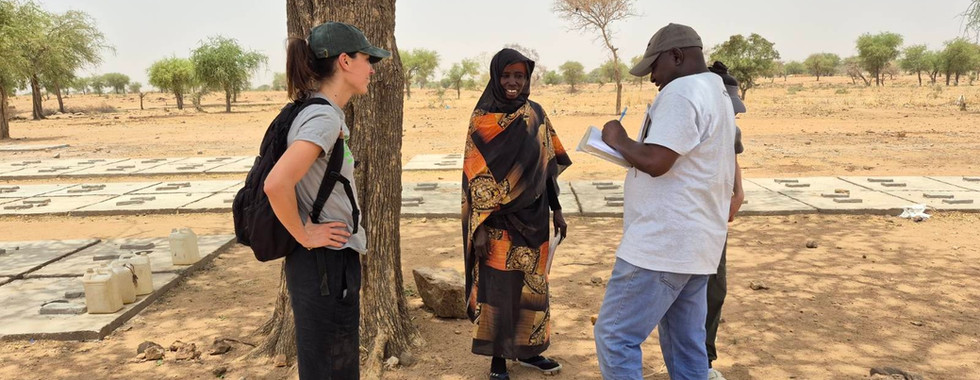Two Continents, Two Different Early Childhood Education Partnerships
- Felicia Lee
- Sep 22, 2025
- 5 min read

“She is always singing songs and the rest of the children are also acting like her. That is the impact.” - Mother of a Little Ripples student
Decades of research have shown that the first five years of life are critical for a child’s brain development and lifelong wellbeing. During this time, hundreds of neural connections form every second, shaping how a child thinks, feels, and relates to the world. Adverse experiences in these early years, such as displacement, trauma, and food insecurity, can have long-term effects on physical health, learning capacity, and mental health, unless children receive nurturing care, play, and early learning opportunities.
Yet, less than 2% of international humanitarian funding today goes toward early childhood education. Care for young children is still largely viewed as the responsibility of caregivers or families. We could ease the burden on caregivers — primarily women and older female siblings — and transform the trajectory of children’s development by resourcing communities with programs that care for their youngest members. So, why wouldn’t we?
This is why iACT continues to invest in supporting young children.

Little Ripples: an iACT Early Childhood Education Program
Little Ripples focuses on the social-emotional, cognitive, and social development of children ages three to five through trauma-informed, play-based learning. It is led, managed, and operated by people who are either a part of or adjacent to conflict-affected communities – including those made up of refugees, internally displaced persons, migrants, and other people on the move.
With iACT’s approach of letting communities lead the work, Little Ripples inherently looks different in each context. For example, in one refugee camp in Chad, the program is held in a school building; in other camps in that region, Little Ripples is hosted in families’ homes. When the program was operating in Greece in a camp for people on the move, classes were held at a community center and there was a rotating roster of teachers due to the high number of people constantly passing through and moving on to other countries.
iACT is currently pursuing two new partnership models to expand early childhood education in communities with large numbers of displaced children. Our intention is to continue to evolve the ways we can be the best possible partner in this work, adapt to different contexts, and lay the groundwork for sustainable, community-led early childhood education.
Two Continents, Two Different Approaches

Alacha, Chad: In Refugee Camp Alacha in eastern Chad, we are trying out a style of partnership completely new to iACT. Whereas our original Little Ripples model involves co-creating early childhood education programs from the ground up, our approach in Alacha recognizes and builds upon the initiative taken by the men and women in the camp who have already turned their homes into informal learning spaces.
Although the camp is hosting more than 5,000 children between the ages of three and five, only a handful of NGO-run early childhood programs are available. Nowhere near enough for all of the children to attend. As such, caregivers and camp leaders expressed the need for external support for community-run spaces. This has been their message since the first time iACT colleagues living in other refugee camps in eastern Chad visited Alacha in spring of 2024.
Multiple discussions between Alacha home-hosted childcare leaders and iACT team members over the last year led to a new partnership agreement. iACT will be providing support in the form of educational material items, monthly funding to help the childcare hosts cover some daily living expenses so that they can focus on children’s activities, and training on iACT’s learning methodology. Each month, the hosts will share information with iACT regarding attendance, activities, and behavioral changes in children. This regular engagement between the Alacha community and iACT team members is intended to cultivate a community of practice within which learnings can be shared.

Tijuana, Mexico: Similar to Alacha, the US-Mexico border city of Tijuana has been experiencing a shortage of services for migrants and people on the move. Few children in these communities have access to education programs, and preschool-aged ones are falling especially behind while their families either hope for the (currently) unlikely opportunity to cross into the US, or face the difficult consideration of returning to the places they originally fled.
A team of five, consisting of individuals from both the local and migrant communities, are building up Little Ripples in two different sites – one a shelter and the other a neighborhood center. The Little Ripples-Tijuana team is working directly with iACT and two other organizations, both of which are located and operated in Tijuana: Centro32 and Border Line Crisis Center. This differs from the Alacha model, where it is a partnership only between iACT and local community members.
The process for the partnership in this context began in December 2024, with weekly working calls between all three organizations and a learning/research trip to Tijuana to work with caregivers in co-designing the program and curriculum. This is the first time that iACT has partnered directly with other organizations and community members simultaneously and from the very beginning of an opportunity to implement one of our programs.
After months of collaboration, Little Ripples launched in Mexico the last week of July 2025 and is currently operating three days a week at two different locations. As we continue to learn about the context and constantly shifting situation there, the program will continue to evolve as necessary.
What Do We Learn from Trying New Approaches?
As with any other kind of "pilot" project, adjustments to these two forms of partnership will be made as the involved stakeholders see fit. We are giving ourselves at least one full year in both contexts to “test” implementation, evaluating our work periodically and regularly. Piloting is critical because it allows iACT to experiment, adapt and improve before expanding the partnerships and programs. It reduces the risks of imposing top-down solutions that may not fit local realities and instead creates space and time for ideating, responsiveness and collaboration. And equally important, our commitment to a community-led approach ensures families and caregivers and community leaders shape the programs that affect them most and hold us accountable to creating and resourcing the best possible solution for their community at that point in time, and ongoing.
In short, piloting with a community-led approach allows us to do more than test a model; it lets us create solutions with those who know their children and communities best, ensuring that our work is both relevant today and sustained/resilient for the future. And the fact that we have to say that or advocate for this, is ridiculous.
iACT would like to express its gratitude to the community of refugee camp Alacha, the organizations of Centro 32 and Border Line Crisis Center, and both the long-term and short-term residents of Tijuana, for their partnerships with us. iACT also thanks the staff members of IOM-Mexico working in the Comunidad AVES center, for their ongoing help and support.
For more information about our approach or our early childhood education work, send an email to felicia@iact.ngo or to info@iact.ngo.














